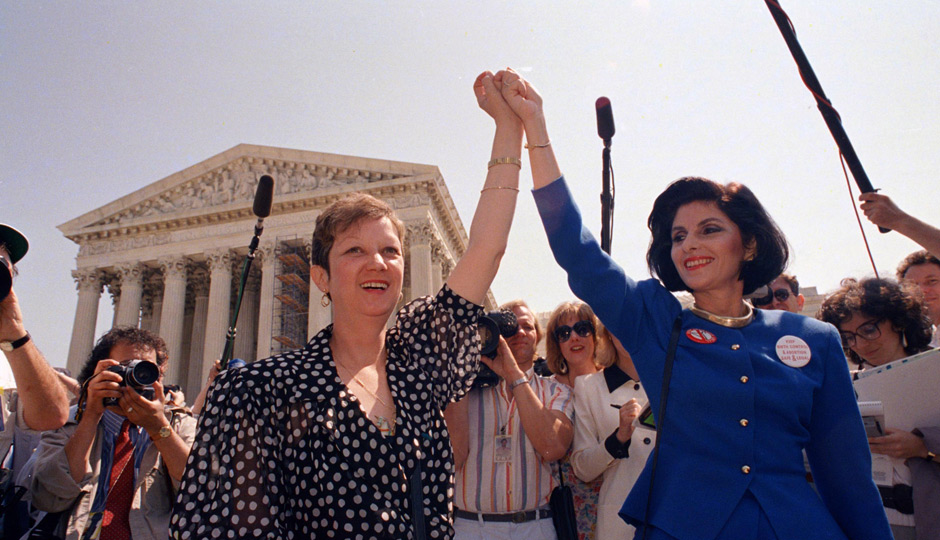Roe V. Wade Turns 41 Next Week
And we still can't have a civil discussion about abortion. We can barely even say the word.

Norma McCorvey, Jane Roe in the 1973 court case, left, and her attorney Gloria Allred hold hands as they leave the Supreme Court building in Washington, DC., Wednesday, April 26, 1989 after sitting in while the court listened to arguments in a Missouri abortion case. The court’s decision may overturn the 1973 Roe v Wade case which legalized abortion. (AP Photo/J. Scott Applewhite)
January 22 will mark the 41st anniversary of Roe v. Wade. There’s been little discussion surrounding it, despite the emergence of a case over Arizona’s attempt to reinstate a ban on abortions after 20 weeks that might have sent the decision back to the Supreme Court. And maybe that’s because there’s simply no “discussing” the topic. The way we talk about abortion — or don’t talk about abortion — has made finding common ground on the complicated issue impossible.
I have four close friends who have been impacted by abortion. Not all of them are women.
Each with different circumstances, they’ve chosen choice. And each uses the same cryptic language to talk about “the procedure,” as it’s referred to in polite conversation. Abortion is the elephant in the room that they — staunch pro-choicers who still believe it’s best not to have to make the choice at all — all navigate around.
I’ve talked about abortion with women who are my parents’ age, surprised to learn some of them, too, have had abortions. (Many of them, too, find other words to describe their experiences.) I’m surprised by my own surprise at their revelations; it’s not as if there’s only one type of woman who has an abortion. In the first decades since Wade, the typical abortion patient was young and white; according to The American Prospect, “the typical abortion patient these days is a 20-something single mother of color.”
The reasons for this are largely driven by greater socioeconomic barriers to contraception, and therefore, to abortion as well. “Women in the middle class continued to see unplanned pregnancies decline” in the 1990s when things began to change, according to The American Prospect.
Rather than talk about sensibly about abortion and how both sides of the argument can to meet in the middle to truly help young women protect themselves (additional funding for preventing unintended pregnancy would be a start), real conversations about abortion have been derailed, making it easy to forget what we were fighting for. Because we aren’t having intelligent conversations, fewer women are getting the access, education and care they need.
Like the first oral contraceptive pill in 1960, the Roe v. Wade decision was a landmark occasion for reproductive rights advocates and for women (though, as I noted above, women are not the only people affected.) Abortion, like birth control, is an issue that is framed as a “women’s rights issue,” when in reality, it affects women and their partners. Of course, a woman’s right to have autonomy over her body is at the heart of the debate on the pro-choice side, but intelligent conversations about sexual health and reproductive rights should be include men’s voices as well. By framing these discussions as “women’s issues,” it becomes a niche, special-interest concern, making the general public dismissive of the issues at hand at the expense of people who are most affected.
But curiously, 41 years since the Supreme Court’s decision, conversations about abortion remain polarizing and counter-productive, hurting women most of all. As politics are played and our nation’s cultural views shift — with states oscillating between blue and red with the turn of each election cycle — we lose opportunities to use our better judgment.
Both sides of the debate can agree that abortion is a divisive issue. It’s both personal and widespread in its nature — a basic question of how much ownership women have over their bodies, and what responsibility, if any, the government bears for the unborn — something that’s not so “one size fits all.” I’d say if you don’t believe in abortions, don’t have one; but the very option is universally unacceptable to some. As an all-or-nothing proposition, it’s impossible to find common ground.
Or intelligent discourse.
Early last year, democratic state Sen. Wendy Davis of Texas filibustered for an astonishing 13 hours against the state’s stringent anti-abortion law. Since then, Denton County GOP Chair Dianne Edmondson labeled her “Abortion Barbie.”
In a misleading and racist response to the increased number of abortion procedures obtained by black women, a smear campaign against black motherhood was launched in Texas, with conservatives (who are shamefully indifferent and/or out of touch on issues of race and class) arguing that “the most dangerous place for an African American is in the womb.” The billboard disregards the socioeconomic equalities that truly put people of color at risk. The ad has also been seen in Soho and Los Angeles. In this particular instance, personal choice has been called “genocide,” an affront to actual genocides defined as the systematic destruction of a racial, political or cultural group. (It is worth noting that the mother of the child featured on the billboards had no idea that her daughter’s image would be used.)
Through careful strategy from anti-abortionist groups, “abortion” and “Planned Parenthood” have a close word association. Because of this, people often forget that the non-profit organization, now over 100 years old, does more than just terminate pregnancies. It is an amazing health resource for women (and men!) on issues of sexuality, relationship health, contraception, and general care. All of which is key when talking about healthy sexual and reproductive health options. For all of abortion’s supposed ills, the general failure to talk about sex may be the biggest casualty of all.
Follow @MF_Greatest on Twitter.


